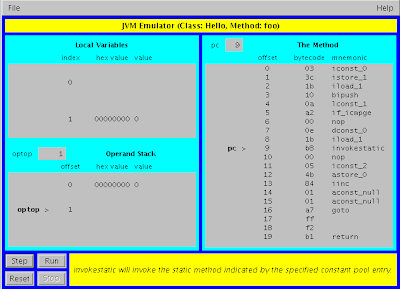The other day I was reviewing some Java code written by a colleague. I noticed that he was in the habit of declaring all the variables used by a method at the beginning of the method body rather than in the places where they were first used. I pointed out that declaring a variable only when it is first required makes the code more readable.
While he agreed to change the style of his code, he was still reluctant to move the declaration of a variable used only within a loop from outside it to inside it. For example, he was reluctant to change:
String s;
for( int i = 0; i < 10; i++)
{
s = String.valueOf( i);
}
to:
for( int i = 0; i < 10; i++)
{
String s = String.valueOf( i);
}
He believed that only one variable is created in the former case while 10 variables are created in the latter - clearly it is more efficient to declare a single variable outside the loop and keep reusing it inside the loop!
I then pointed out the section in the JVM specification that says that a JVM uses a fixed-size array for storing the values of local variables used in a method and each local variable maps to an index in this array. A Java compiler calculates the size of this array during the compilation of a method and declares it in the generated bytecode for the method.
Since he was still sceptical, I compiled both the variants to bytecode, used javap -c to produce the dissassembled code and used diff to show that the generated code was the same in both the cases (except for the indices used for s and i). I then used a simple modification of using the JVM Emulator Applet written by Bill Venners as a standalone application to show the bytecode variants in execution and demonstrate that the size of the local variables array really remains constant throughout.
He was finally convinced.
On the other extreme, I have another colleague who is in the masochistic habit of introducing new scopes to isolate the local variables used only in a section of a method's body. That is, something like:
{
Foo x = wombat.snafu( );
// Use x here.
...
}
{
Bar y = new Bar( a, b, c);
// Use y here.
...
}